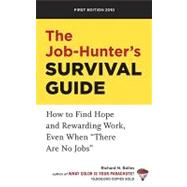
Note: Supplemental materials are not guaranteed with Rental or Used book purchases.
Purchase Benefits
What is included with this book?
| About this Book | p. vi |
| Preface | p. ix |
| There Are Always Jobs Out There | p. 1 |
| How to Find Hope in the Midst of a Brutal Downturn | p. 7 |
| How Long Will I Be Out of Work? | p. 14 |
| The Best and Worst Ways to Look for a Job | p. 24 |
| The Internet: The 10% Solution | p. 45 |
| Do I Need a Resume? | p. 53 |
| Looking for The Job You Used to Have | p. 62 |
| Looking for Your Dream Job | p. 77 |
| A Plan of Action, When You're Out of Work | p. 92 |
| Index | p. 97 |
| About the Author | p. 102 |
| Table of Contents provided by Ingram. All Rights Reserved. |
The New copy of this book will include any supplemental materials advertised. Please check the title of the book to determine if it should include any access cards, study guides, lab manuals, CDs, etc.
The Used, Rental and eBook copies of this book are not guaranteed to include any supplemental materials. Typically, only the book itself is included. This is true even if the title states it includes any access cards, study guides, lab manuals, CDs, etc.
Excerpted from The Job-Hunter's Survival Guide: How to Find Hope and Rewarding Work Even When 'There Are No Jobs' by Richard Nelson Bolles
All rights reserved by the original copyright owners. Excerpts are provided for display purposes only and may not be reproduced, reprinted or distributed without the written permission of the publisher.